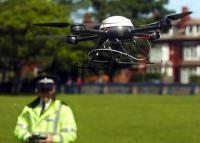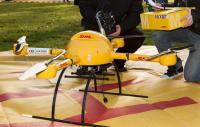-
Rules governing targeted killing by U.S. drones need clarifying
Since the beginning of the conflicts in Iraq and Afghanistan, the United States has dramatically increased use of unmanned drones, developing technology to target and kill those identified as being terrorist leaders. Current U.S. policies on using drones for targeted killing are characterized by ambiguities in interpretations of international law and too many generalities, despite recent efforts by the Obama administration to clarify the policies, a new report finds.
-
-
Israeli tech company’s spyware turns UAE activist’s iPhone into a self-tracking device
Two University of Toronto researchers have uncovered an iPhone-based attack on Ahmed Mansoor, a prominent United Arab Emirates human rights defender. The attack employed spyware produced by NSO Group — an Israeli technology company founded by former members of Unit 8200, the Israeli military’s electronic surveillance branch – which is sold to government for the purpose of spying on their citizens.
-
-
Many sections of Baltimore are under secret, constant aerial video surveillance by BPD

The Baltimore Police Department has secretly deployed a surveillance system using planes and powerful cameras that can continuously record 30-square-mile sections of the city at once. The technology, which is run by a private company, was originally developed for the Defense Department for use in Iraq. It stores the video footage for an undetermined amount of time, and police can use it to retroactively track any pedestrian or vehicle within the surveillance area.
-
-
Technical problems rather than operator errors cause most drone accidents
Research has found that technical problems rather than operator errors are behind the majority of drone accidents, leading to a call for further safeguards for the industry. One of the researchers said the findings illustrated the need for further airworthiness requirements for Remotely Piloted Aircraft Systems (RPAS), as well as the mandatory reporting of all accidents or incidents. “Understanding what happens to drones, even those that don’t cause damage to people or property, is essential to improve safety,” he said.
-
-
Police seized drones trying to smuggle contraband into London prison
The police have seized two drones carrying drugs and mobile phones as they were making their way toward the all-male Pentonville jail in Islington, north London. Drones were increasingly being used to smuggle items into prisons in England and Wales. Figures showed there were thirty-three incidents involving devices in 2015, compared to two in 2014 and none in 2013.bDrugs, phones, mobile chargers, and USB cards were among the items discovered.
-
-
The political role of drone strikes in U.S. grand strategy

Years of debate on the issue of U.S. drone strikes show that many Americans have reservations. People are concerned that drone strikes devalue non-American lives, dangerously expand executive power, and drive terrorism and anti-Americanism. The concerns Americans have about these kinds of drone attacks – apparently unilateral, apparently violating the norm of state sovereignty, and conducted without a formal justice process — reflect well on a public wondering what the U.S. role in the world should be. But assessing the value of drone strikes requires looking beyond the attacks themselves to first identify and prioritize U.S. interests and threats. Only in that context is it possible to decide whether one supports or opposes drone strikes for what they may gain the United States politically.
-
-
CENTCOM’s assessment of U.S. anti-ISIS efforts too rosy: Congressional panel
A congressional joint task force (JTF) investigating allegations of intelligence manipulation at U.S. Central Command (CENTCOM) last week released an initial report detailing persistent problems in 2014 and 2015 with CENTCOM analysis of U.S. efforts to train the Iraqi Security Forces and combat ISIS in Iraq and Syria. The JTF found that intelligence products approved by senior CENTCOM leaders typically provided a more positive depiction of U.S. antiterrorism efforts than was warranted by facts on the ground and were consistently more positive than analysis produced by other elements of the intelligence community.
-
-
Germany to search refugees' phones to establish identity, spot suspicious connections

German interior minister Thomas de Maizière will next week announce a new German anti-terror steps, which, among other things, will require refugees and asylum-seekers arriving in Germany without a passport to surrender their smartphones – and all the passwords and security pin numbers associated with the phones – so German security agencies could check the owners’ social media accounts. The security services in Denmark, Norway, Sweden, and the Netherlands already routinely examine refugees’ mobile phones to establish a refugee’s identity.
-
-
Successful flight test of UAV with mass-actuated controls
For the first time an unmanned aerial vehicle that uses moving weights in its wings, instead of traditional control surfaces or ailerons to turn, was successfully flight-tested. A recently graduated University of Texas at Arlington student used existing UTA research to design, build, and test a UAV that uses mass actuation — weights that move back and forth within the wings to change the center of gravity from side to side — to turn while airborne.
-
-
New tool keeps track of violent groups without having to geolocate the tweets
Researchers have developed new sentiment analysis algorithms which can monitor the social network Twitter in search of violent groups. The system analyzes both the messages these individuals share and how their relationships develop. The police and other law enforcement agencies could use the tool to detect critical points, threats, and areas with concentrations of potentially dangerous people.
-
-
ISIS using drones with explosives, spy cameras: Pentagon

The Pentagon says that ISIS fighters are have been posing a growing threat to U.S. and Iraqi forces by using small commercial drones to carry improvised explosives devices (IEDs) or surveillance cameras. These drones are especially threatening because they can evade detection. The growing threat led the Joint Improvised-Threat Defeat Agency, the Pentagon’s office charged with keeping tab on and countering IEDs, to ask Congress for permission to reallocate $20 million to provide money for a counter-drone program.
-
-
Intelligence agencies spy on our data by manipulating computer chips
Researchers work to develop mechanisms that will render the Internet of Things more secure. They focus on a specific security gap: the manipulation of computer chips, that is, hardware components. These components can be found not only in PCs and laptops, but also in all other devices with integrated electronics; those include credit cards, cars, and smartphones, as well as large industrial facilities and medical equipment.
-
-
Trump calls for profiling of Muslims, surveillance of mosques
Providing more details about his response to the Orlando shooting, Donald Trump on Sunday proposed the profiling of Muslims by law enforcement, and the nation-wide implementing of a Muslim surveillance programs which was used for a while by the NYPD, but which was discontinued after it had failed to yield a single useful lead.
-
-
Tracking, analyzing how ISIS recruits through social media

A team of researchers has developed a model to identify behavioral patterns among serious online groups of ISIS supporters that could provide cyber police and other anti-terror watchdogs a roadmap to their activity and indicators when conditions are ripe for the onset of real-world attacks. The researchers apply the laws of physics to study how terrorist support groups grow online, and how law enforcement can track activities.
-
-
Weak spots in Europe’s “Right to be Forgotten” data privacy law
Under Europe’s “Right to be Forgotten” law, citizens there can petition Internet search providers such as Google to remove search results linked to personal information that is negative or defamatory. In many cases, these links lead to information about accusations of criminal activity or financial difficulties, which may be “delisted” if the information is erroneous or no longer relevant. But “gone” doesn’t always mean “forgotten,” according to a new study.
-
- All
- Regional
- Water
- Biometrics
- Borders/Immig
- Business
- Cybersecurity
- Detection
- Disasters
- Government
- Infrastructure
- International
- Public health
- Public Safety
- Communication interoperabillity
- Emergency services
- Emergency medical services
- Fire
- First response
- IEDs
- Law Enforcement
- Law Enforcement Technology
- Military technology
- Nonlethal weapons
- Nuclear weapons
- Personal protection equipment
- Police
- Notification /alert systems
- Situational awareness
- Weapons systems
- Sci-Tech
- Sector Reports
- Surveillance
- Transportation
Advertising & Marketing: advertise@newswirepubs.com
Editorial: editor@newswirepubs.com
General: info@newswirepubs.com
2010-2011 © News Wire Publications, LLC News Wire Publications, LLC
220 Old Country Road | Suite 200 | Mineola | New York | 11501
Permissions and Policies
Editorial: editor@newswirepubs.com
General: info@newswirepubs.com
2010-2011 © News Wire Publications, LLC News Wire Publications, LLC
220 Old Country Road | Suite 200 | Mineola | New York | 11501
Permissions and Policies
